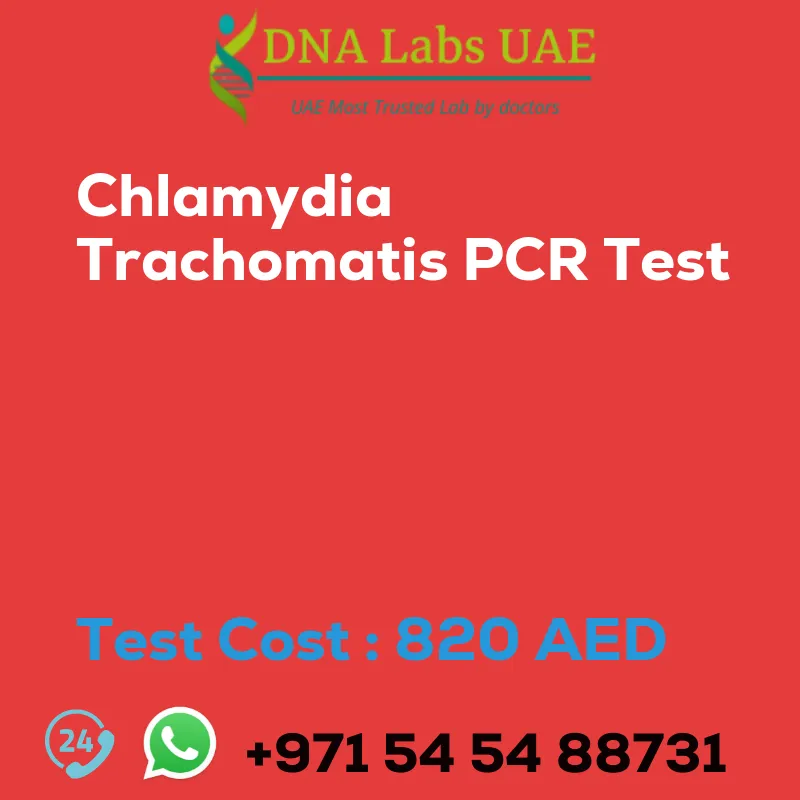CHLAMYDIA TRACHOMATIS PCR Test Cost AED: 820.0
Test Name: CHLAMYDIA TRACHOMATIS PCR Test
Components: Polymerase Chain Reaction (PCR)
Price: 820.0 AED
Sample Condition: 10 mL (5 mL min.) urine in a sterile screw capped container OR Genital / Conjunctival swabs in normal saline. Ship refrigerated or frozen.
Report Delivery: Sample Daily by 11 am; Report Next day
Test Type: Infections
Doctor: Physician, Gynecologist
Test Department: MOLECULAR DIAGNOSTICS
Pre Test Information: No special preparation required
Test Details:
The CHLAMYDIA TRACHOMATIS PCR test is a diagnostic test used to detect the presence of Chlamydia trachomatis, a bacteria that causes the sexually transmitted infection (STI) known as chlamydia. PCR stands for polymerase chain reaction, which is a laboratory technique used to amplify and detect specific DNA sequences. In the case of the CHLAMYDIA TRACHOMATIS PCR test, it amplifies and detects the DNA of Chlamydia trachomatis bacteria in a patient’s sample.
To perform the test, a healthcare provider collects a sample from the patient, typically by swabbing the cervix in women or the urethra in men. The sample is then sent to a laboratory, where the PCR technique is used to detect the presence of Chlamydia trachomatis DNA. If the DNA is detected, it indicates that the patient has an active chlamydia infection.
The CHLAMYDIA TRACHOMATIS PCR test is highly sensitive and specific, meaning it is very accurate in detecting the presence of Chlamydia trachomatis. It is considered one of the most reliable tests for diagnosing chlamydia, especially in cases where other diagnostic methods, such as culture or antigen tests, may not be as effective.
It is important to note that the CHLAMYDIA TRACHOMATIS PCR test requires specialized laboratory equipment and trained personnel to perform. Therefore, it is typically only available in medical clinics or laboratories. If you suspect you have a chlamydia infection, it is recommended to consult with a healthcare provider who can order the appropriate tests and provide appropriate treatment if necessary.
| Test Name | CHLAMYDIA TRACHOMATIS PCR Test |
|---|---|
| Components | |
| Price | 820.0 AED |
| Sample Condition | 10 mL (5 mL min.) urine in a sterile screw capped container ORGenital \/ Conjunctival swabs in normal saline. Ship refrigerated or frozen. |
| Report Delivery | Sample Daily by11 am; Report Next day |
| Method | Polymerase Chain Reaction |
| Test type | Infections |
| Doctor | Physician, Gynecologist |
| Test Department: | MOLECULAR DIAGNOSTICS |
| Pre Test Information | No special preparation required |
| Test Details |
The CHLAMYDIA TRACHOMATIS PCR test is a diagnostic test used to detect the presence of Chlamydia trachomatis, a bacteria that causes the sexually transmitted infection (STI) known as chlamydia. PCR stands for polymerase chain reaction, which is a laboratory technique used to amplify and detect specific DNA sequences. In the case of the CHLAMYDIA TRACHOMATIS PCR test, it amplifies and detects the DNA of Chlamydia trachomatis bacteria in a patient’s sample. To perform the test, a healthcare provider collects a sample from the patient, typically by swabbing the cervix in women or the urethra in men. The sample is then sent to a laboratory, where the PCR technique is used to detect the presence of Chlamydia trachomatis DNA. If the DNA is detected, it indicates that the patient has an active chlamydia infection. The CHLAMYDIA TRACHOMATIS PCR test is highly sensitive and specific, meaning it is very accurate in detecting the presence of Chlamydia trachomatis. It is considered one of the most reliable tests for diagnosing chlamydia, especially in cases where other diagnostic methods, such as culture or antigen tests, may not be as effective. It is important to note that the CHLAMYDIA TRACHOMATIS PCR test requires specialized laboratory equipment and trained personnel to perform. Therefore, it is typically only available in medical clinics or laboratories. If you suspect you have a chlamydia infection, it is recommended to consult with a healthcare provider who can order the appropriate tests and provide appropriate treatment if necessary. |








